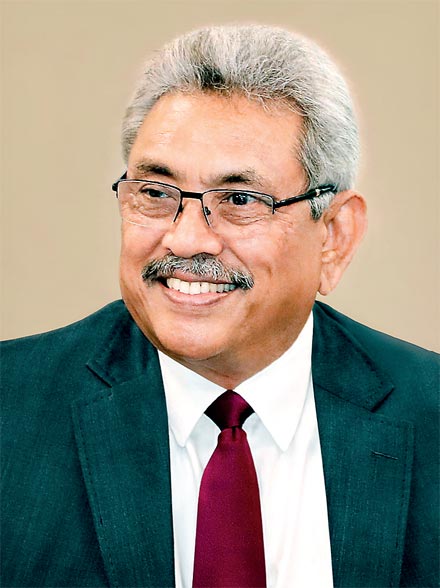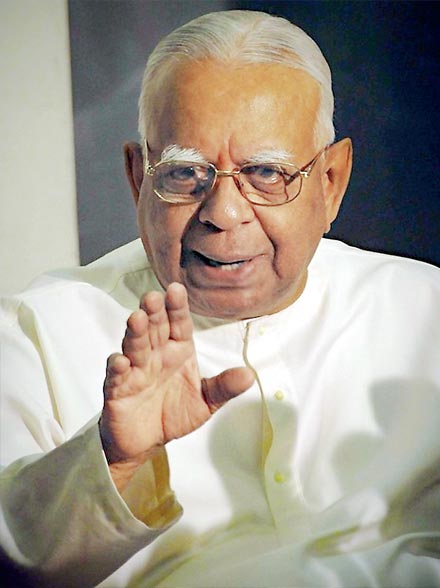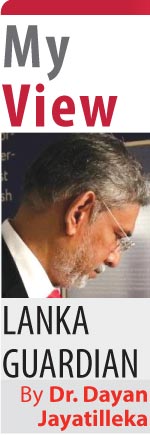Sunday Feb 15, 2026
Sunday Feb 15, 2026
Thursday, 6 January 2022 00:20 - - {{hitsCtrl.values.hits}}

President Gotabaya Rajapaksa

TNA Leader R. Sampanthan
|
 Susil Premjayanth is one of the good ones; educated, intelligent, experienced, a fine speaker and debater be it in parliament or on TV. He is not one of those the protesting peasants refer to rudely as “the buffaloes in Parliament”. An SLPP member, he represents what is best in the SLFP tradition: he is a moderate, progressive centrist. Someone who should have wielded a top portfolio, he has been deprived of his State Ministry by President Gotabaya. By so doing, President GR has fired a stalwart of the political culture and tradition of which his late father was a co-founder.
Susil Premjayanth is one of the good ones; educated, intelligent, experienced, a fine speaker and debater be it in parliament or on TV. He is not one of those the protesting peasants refer to rudely as “the buffaloes in Parliament”. An SLPP member, he represents what is best in the SLFP tradition: he is a moderate, progressive centrist. Someone who should have wielded a top portfolio, he has been deprived of his State Ministry by President Gotabaya. By so doing, President GR has fired a stalwart of the political culture and tradition of which his late father was a co-founder.
It won’t help. Not only will Premjayanth get more publicity than before; he will be more openly critical than before. President Gotabaya may have thought he was removing a pebble from his shoe, but he may well have set rolling the pebble which will precede the coming landslide of the SLFP and part of the SLPP—one notes Vidura Wickramanayake’s critical voice—as the economic crisis worsens, the harvest fails, and the SLPP-SLFP’s vote base, the peasantry, hits the streets demanding economic justice and reparation.
Beat the Regime in 2022
The best political satire I’ve seen in recent months doesn’t contain even one clever punchline. It is a new genre, a cross between a silent movie (no dialogue), a news documentary and reality TV. It is shot from within a four-wheel drive, which moves at a moderate pace on a single continuous but short trip, with the camera focusing on the sidewalks with unending lines of grim-faced and often vociferous citizens, waiting for gas, kerosene, milk, etc. From inside the vehicle, the speakers blare Gotabaya Rajapaksa’s campaign song. When the chorus comes along, young voices inside the vehicle join in, and yell out in unison “Goh-taa-bhaya!”. A passenger in the front seat, who isn’t yelling, laughs and places his palm on his forehead after gazing at the queues. It is black humour at its best.
You’ve heard of the classification and category ‘backsliding democracy’. Democracy isn’t the only thing that’s backsliding in Sri Lanka. So too are farming, cooking and nutrition. When Andre Gunder Frank wrote of the “development of underdevelopment”, he didn’t know the half of it.
In his chat with the newspaper editors, President Gotabaya spoke critically of the media coverage of the explosions of gas-cookers, without once acknowledging the report of his own panel of experts who traced the cause to the change in ratio of the gases. Who is accountable?
Sri Lankan analysts of the economic crisis are roughly divisible into two: those who place the greatest emphasis on the debt and foreign exchange crisis, and those, like me, who place the greatest emphasis on the crisis of agrarian production and the likelihood of a food shortage, due entirely to the President’s blindly insensitive, arrogant and unscientific fertiliser-weedicide-pesticide policy.
Though I did work with Immanuel Wallerstein, the iconic thinker on world systems and world economy, I’m no economist. However, I am a student of conflict, revolution and wars, and I know of far fewer internal conflicts triggered by debt and forex crises and far more detonated by the collapse of harvests and resultant famines or extreme food shortages. This is more so when those crashes of harvests, the resultant shortages and mass misery are seen as avoidable and ruler/ruling elite-created.
There are countries which have experienced crisis due to debt repayment, a hard-cash crunch or sanctions, but almost all of them have peasant agriculture to fall back on. Russia faced Western sanctions by boosting agricultural productivity, and it was certainly not through conversion to organic fertiliser but through redoubled efforts in scientific agriculture. If it was the cash crunch that triggered the cutback in fertiliser imports, contracts should have been given to local and foreign industrialists to produce chemical fertiliser, pesticides and weedicide in Sri Lanka well before embarking on this program of ‘agricide’ (or ‘peasanticide’) through a ‘shock-and awe’ ban.
There is a possibility of defeating the regime in 2022, which doesn’t necessitate the interesting proposal of lawyer Sunil Watagala of the JVP, of the early dissolution of Parliament, nor does it depend entirely on ceaseless street demonstrations over economic grievances.
That possibility will be provided by the President’s project of a new Constitution. It will be perfectly possible to call for and win a massive ‘No’ vote at a referendum in this year of the avoidable economic torture of the citizenry. Not even Augusto Pinochet was able to survive defeat at a Referendum.
No more Mr. Nice Guy?
The Spanish term “querencia” refers to the patch of ground that the besieged bull stakes out in the bull-ring during a bull fight. It is the place where the bull makes his stand and from which he charges. More generally, “querencia” has come to mean a spot from which a personality chooses to make his/her stand. Besieged President Gotabaya Rajapaksa has just demarcated his querencia, and there are no surprises as to the space he has demarcated and has chosen to place himself. It is his home-ground.
He also gives a valuable clue as to his future intentions.
The evidence is in the text of his speech of 2 January 2022 at the ceremony to confer honorary title of “Sri Lankadheeshwara Padma Vibhushana” on President GR by the Kotte Sri Kalyani Samagri Dharma Maha Sangha Sabha.
“…I would like to specially mention the fact that I was born into a Buddhist family, the disciplines I received when I was studying at Ananda College, Colombo, one of the leading Buddhist schools in the country, the inspiration I received from following the advices (sic) of the Maha Sangha and the discipline I received from serving in the Army were the factors that made my life better.
“Today the Maha Sangha bestowed on me an honorary title in recognition of my service towards the country as a military officer and Secretary of Defence. During my twenty years of military service, I had been involved in military operations carried out in the initial stages of the Eelam War and Second Eelam War as well as operations carried out in the north and east areas. Before the arrival of the Indian Peace Keeping Force, I commanded one of the four brigades in the Vadamarachchi operation, the largest operation of the time. At the outbreak of the Second Eelam War, I commanded one of the two main brigades to liberate Jaffna Fort. I carried out several operations in areas like Welioya, Vavuniya and Trincomalee. In recognition of those services, I received the Ranashura and Ranawickrama medals and President’s Award. The Maha Sangha is fully aware of the service rendered by me directly as the Defence Secretary to the end of the thirty years of war.
“…On the day I was sworn-in as the country’s President at the Ruwanweli Seya, I declared that I was a President elected by the majority of Sinhalese. I firmly believe that the protection of Sinhala Buddhists, who have made so many sacrifices to elect me as the first citizen of this country and that heritage is my foremost responsibility…” (Ada Derana/PMD)
Here comes his crucially significant signal as to the strategic direction he has decided to move in:
“I am ready to embark on a new journey by overcoming the obstacles we have encountered so far, and to fulfil the aspirations of the people who elected me as President of this country. I responsibly declare before this Most Venerable Sangha community that I am ready to take any tough or bold decisions that need to be taken in this regard…” (Ibid)
What the speech tells us is that the President is sticking to his hard-core Sinhala Buddhist discourse and base. The obvious problem with playing this card is that most of the angry rice farmers are Sinhala Buddhists, as are most in the queues for milk-food, cooking gas and kerosene. They are mad at him and the ruling elite (starting with the ruling family), and they are angry not as Sinhala Buddhists but as human beings. The President must understand at least now, why the Buddha advised against preaching the Dhamma to those with an empty stomach.
Going by his declaration of intent, the President initially hopes to move forward with those Sinhala Buddhists who are not suffering the same economic hardships as the rest of the citizenry. That would range from the uber-rich ultra-right, to the military brass. Furthermore, he hopes to rekindle the Sinhala Buddhist identity consciousness among those Sinhala Buddhists who are embittered towards him over socioeconomic pain generated by his policies.
How does he hope to do this? There are some clues in his words: “…a new journey…to fulfil the aspirations of the people who elected me as President …I am ready to take any tough or bold decisions that need to be taken in this regard…”
What kind of “new journey” and “tough and bold decisions” might he have in mind? Given the President’s known agenda, it is reasonable to assume that in the first instance he means the new Constitution, in which the primacy of Sinhala Buddhist identity and heritage will be given unprecedentedly hegemonic status, thereby either flipping the Sinhala Buddhists from economic grievances back to an ethno-religious majoritarian consciousness, or at the least, causing a split among the Sinhala Buddhists on the lines of economics versus ethno-religiosity.
Or could it be an enhanced role, perhaps even the ultimate enhanced role, for the sword and shield, if not the martial custodian, of that “heritage” and those “aspirations”, i.e., the military?
I do not know whether Minister Basil Rajapaksa is to be made Prime Minister as is rumoured in the media. Given that Mahinda Rajapaksa is the sole sentimental adhesive keeping the coalition and even the ruling SLPP going, that may not be on the cards. What I do know is that Basil Rajapaksa’s territory of economic development is already being invaded. In his address of 30 December 2021 to the tri-forces based in Mullaitivu, Army chief, Gen. Shavendra Silva announced that the economic development of the area has been entrusted to the Army by President Gotabaya Rajapaksa. This was aired on the TV newscasts. (Watch from minute 19, https://m.youtube.com/watch?v=qgE7mO0y_Ls) Where does that leave Minister Basil Rajapaksa and the Sri Lankan Cabinet Ministers?
Meanwhile the Army chief who seized power in Sudan has had to step down due to unremitting street protests by the Sudanese people. There’s a lesson in there somewhere.
Tamil talks: Last train
The process of negotiation among the Tamil and Muslim parties over a consensus document to be addressed to India with regard to the Accord and the 13th amendment in light of the coming Constitution, has not been brought to a closure at the time of writing this column, though it was to be finalised around New Year.
The delay deprives the Tamil side of the chance of insinuating its issues into the subtext of, or the trade-offs in, what might well be the Indo-Sri Lanka Economic Accord. The economic package could also be considered Indo-Sri Lanka Accord 2 or the completion of the original Indo-Sri Lanka Accord, with reference to the economic footprint in Trincomalee. The closure on that issue may by-pass or supersede the original reason for the 1987 Accord, the Tamil Question, because the dominant Tamil party seems not to know or care that the Tamil autonomy project is in the Last Chance Saloon.
If signing-off on a basic Tamil consensus is quite so fraught even when time is of the essence and the stakes and the odds are at their historical highest, then it is no surprise that the Tamils find themselves in the dead-end they do, and it will be no surprise if they lose everything that India obtained for them and are left with no semi-autonomous sub-state political space – even on paper – in their “historical habitation” which is now pretty much controlled by the military.
The delay on the Tamil political side may cause forfeiture of the residual return that may accrue to it with India’s economic backstop – though that Indian input may be matched or offset by whatever generosity China’s Foreign Minister Wang Yi brings in his wallet.
In geometry, especially political geometry, the higher your apex, the narrower your base. The broader you wish the buy-in to be, the more stakeholders you hope to attract, the lower must be your apex. The higher you pitch your political stand and thicken your discourse, the more difficult to get the SLMC on board. Since the SLMC has been part of the ongoing discussion process from its earliest days, some Tamil parties are loathe to let it go and be content with a Tamil consensus. This means that a Tamil consensus itself may have to be limited to the north and part of the east (the 1977 electoral map), losing those Tamil organisations representing the Tamils of recent Indian origin, based outside the north and east.
If the ITAK had been reasonable enough to accommodate the SLMC, it could have stood at the head of a bloc of Tamil-speaking people(s), also incorporating the Tamil parties outside the north and east. Now, with the window of opportunity about to shut, it is imperative to clinch a northern and eastern Tamil ‘heartland’ consensus.
In the currently ongoing process, the more pragmatic position around the full implementation of the 13th amendment was arrived at by the Tamil parties which had done the hard yards from the 1970s as militant organisations; the ones who belonged to the “Iyekkam” (The Movement). They have (belatedly) displayed a Sinn Fein-type pragmatism.
The ITAK behaves like the Palestinian Authority (PA) but without the Authority.
The demagogic counterview to the effect that “the Tamil people did not shed so much blood to seek and accept the full implementation of the 13th amendment; if so, we could have settled everything back in 1987; we should await a new US initiative” came, ironically enough, from the purely parliamentarian Tamil nationalist wing, which had not taken the risks and made the sacrifices of militant engagement and experience.
Had the Yahapalanaya Government of 2015 embarked on the full implementation of the 13th amendment, who would have opposed it? Not President Sirisena, PM Wickremesinghe or de facto Opposition leader Mahinda Rajapaksa. Instead, the TNA/ITAK’s push for a brand-new Constitution with a non-unitary character helped fissure the hybrid government, split the SLFP, provoke the emergence of the SLPP, catalyse the hawkish candidacy of Gotabaya and electorally extinguish the UNP. The ITAK/TNA also helped jam-up the holding of Provincial Council elections.
|
With traditional inter-state interactions (India-China-Sri Lanka) and economic diplomacy about to decisively eclipse sub-state political nationalism, the Tamil leaders must decide whether the only tangible political gain of 70+ years of the Tamil struggle i.e., the Accord/13A/PCs, will be buried by their own grand-standing and dithering. Now that’s an exercise in self-determination. Perhaps the last there will be time and space for.